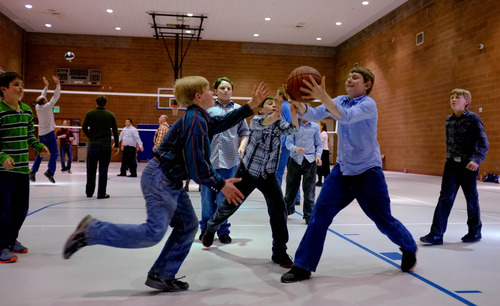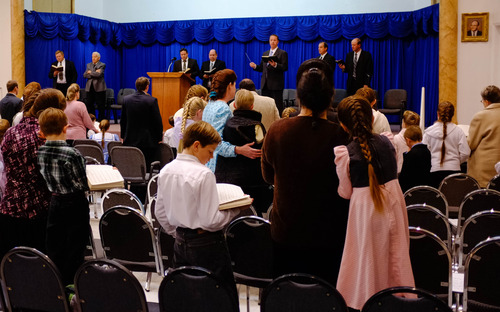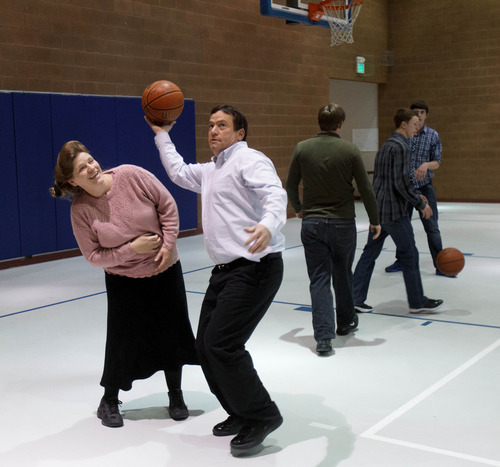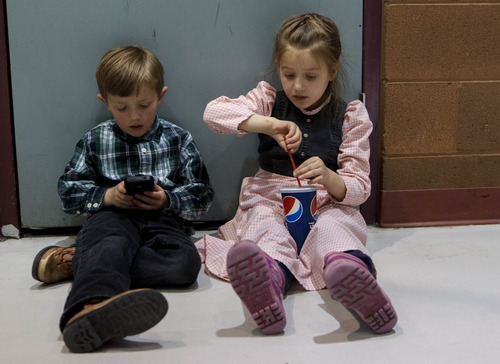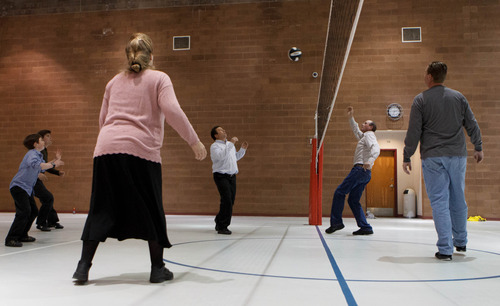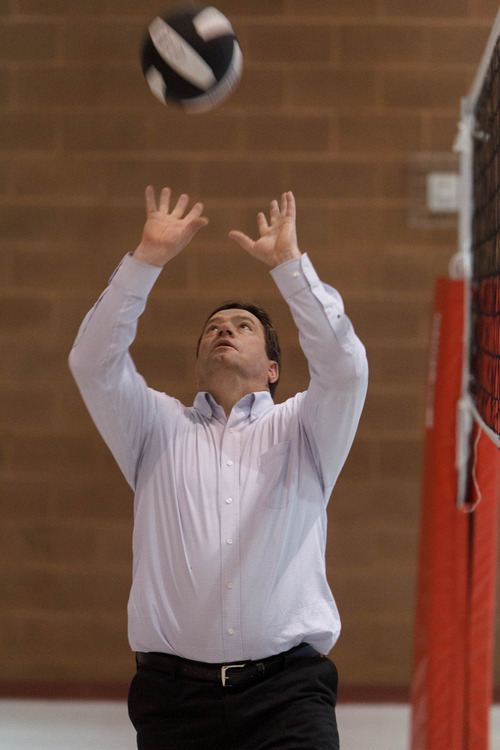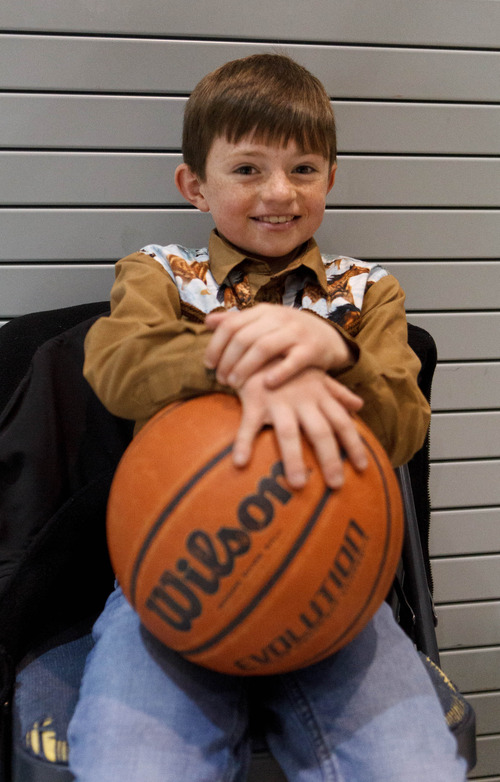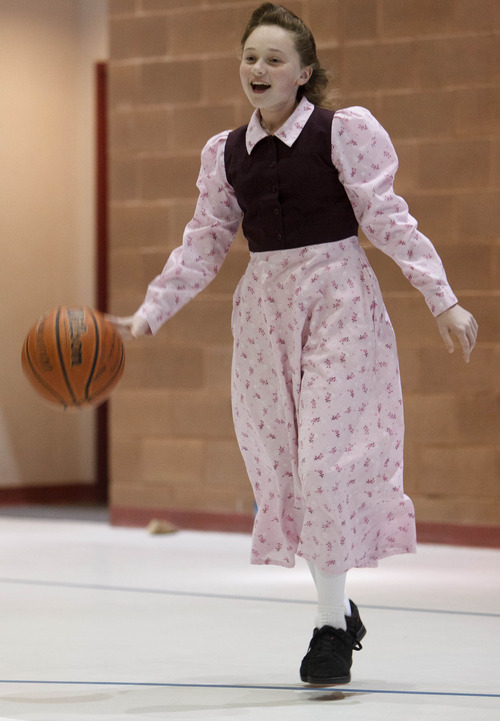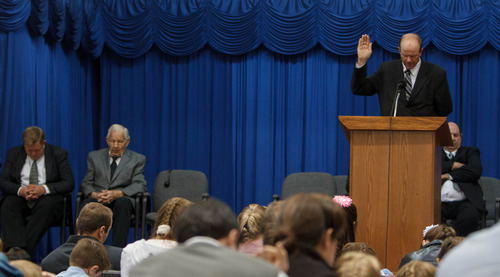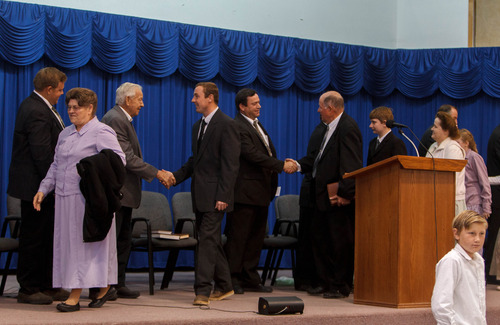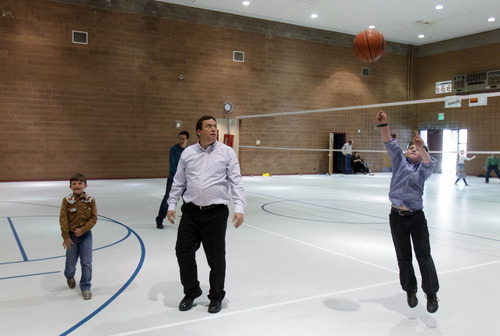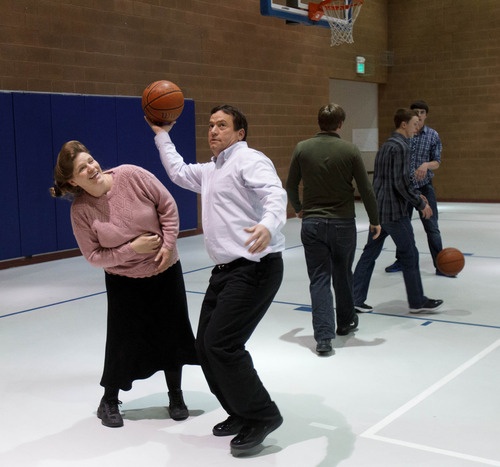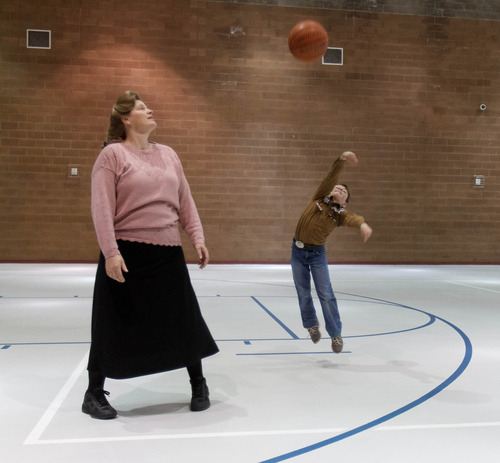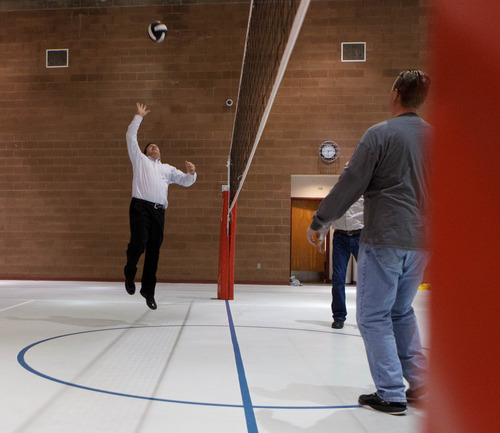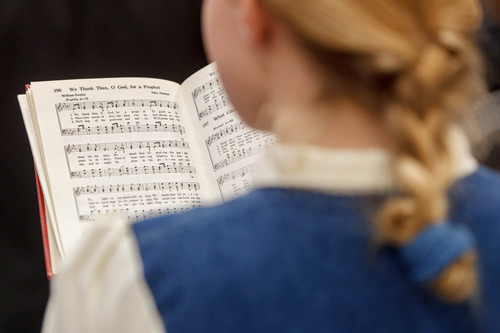This is an archived article that was published on sltrib.com in 2013, and information in the article may be outdated. It is provided only for personal research purposes and may not be reprinted.
Hildale • Holm Sunday School sits just beneath a large red bluff on the edge of Hildale. Like many buildings in the area — known locally as Short Creek — it's surrounded by a tall wooden fence. A block away, the Fundamentalist Church of Jesus Christ of Latter-Day Saints operates its secretive clinic. Security cameras hang from nearby buildings.
Just before 11 a.m. on Feb. 17, members of William E. Jessop's congregation begin to pull into the Holm school parking lot. As the first large vans stop, the air is so still the sound of a paper cup rolling along the asphalt echoes against the nearby cliffs. A cock crows in a distant yard. Red dust swirls in the partially paved streets.
Quickly, men in charcoal suits and women with tightly coiffed hair move into the school's cold, cavernous gymnasium. They sit on an array of mismatched chairs with foam padding bursting through the threadbare upholstery. On a wall, photos of past FLDS leaders smile beatifically down on the group. Several propane heaters hiss in the quiet.
Jessop begins the meeting at 11:05 a.m. He rises from his chair on the gym stage and steps up to a podium, several papers clutched in both hands.
"We feel very blessed by Heavenly Father to meet again," Jessop says.
—
'We're not alone' • Jessop and his congregation are all former members of the polygamous FLDS church. At some point in their lives, they followed Warren Jeffs, believing he was a prophet. Eventually, they all abandoned him, often after being kicked out during one of the church's recent purges.
Jessop organized the group in April or May of 2011. When the congregation began meeting, members gathered in the R&W Building, an excavating business owned by former Jeffs spokesman Willie Jessop. In the fall of that year, the group moved to the Holm school, a building owned by the now state-controlled United Effort Plan.
The group has no name. William E. Jessop's first wife, Joanna, said some people around town refer to these followers as "WEJes," pronounced similar to "wedges." It's a play on their leader's initials. Joanna said she and her husband's flock don't like the term.
When asked about his role, Jessop paused before finally describing himself as "acting bishop." The congregation calls him "Uncle William," and he explained that the Sunday services began as an effort to follow Jesus' teachings to "meet often."
"It's to realize that we're not alone in our effort," Jessop said.
—
A new song • After Jessop's welcome, the nearly 100-member congregation sings "Let Each Man Learn to Know Himself" — a hymn left out of the latest LDS songbooks but still included in the hodgepodge of hand-me-down, brown hymnals used by the group. Many of the books have broken bindings and the names of former owners — including former FLDS President Rulon Jeffs — scribbled inside. Some of the hymnals have labels saying they are from an LDS stake in Hyrum, 390 miles north in Cache County.
In the corner, a woman with dark hair plays a slow accompaniment as the congregation sings. Sam Allred, whose father led an FLDS choir long ago, conducts with a white baton. When the hymn concludes, a young man in a dark suit offers a prayer, his head bowed and his right hand raised.
The hymn and prayer concluded, Jessop begins teaching the congregation a new song: "Ere You Left Your Room This Morning," which now is called "Did You Think to Pray?" in the mainstream LDS hymnal. Jessop reads a verse, then leads the congregation as they sing it together.
"It's an effort to restore our Sunday School," he later explained of the exercise.
—
Purges and paranoia • Many of the families in Jessop's congregation are small for a polygamous community. Few men appear with multiple wives, and no one has more than a handful of children. Several adults even sit alone.
Attendance at the meeting is a testament to the conflicts that have ripped through Short Creek in recent years. After Warren Jeffs took control of the FLDS church in 2002, he unleashed mass purges. Many men were kicked out and their wives and children ordered into new families. Husbands, wives and children were separated. Today, even from a Texas prison, Jeffs reportedly continues to control the church and expel members for any reason, including attending Jessop's Sunday services.
Many, but not all, members of Jessop's congregation are consequently secretive. They eschew media attention, and attendance this day may have been smaller due to the presence of Salt Lake Tribune staffers. Several group members pointed to white security cameras on nearby buildings, saying they exist to catch people attending Jessop's congregation or engaging in other activities barred by Jeffs' self-described revelations.
The fear among some at Jessop's meeting is that, if they're discovered worshipping with the group, they could incur the wrath of FLDS leadership, meaning they could lose contact with their families, among other punishments.
—
Thankful for a prophet • Jessop's Sunday service offers no communion or sacrament — he said families typically do that at home — so when the singing ends he starts reading from the first section, or chapter, of the Doctrine and Covenants, a book of scripture used by both the FLDS and LDS churches.
Jessop reads the scripture in a subdued voice. At times the PA system almost fails to carry his words to the back of the half-empty room. As he reads, two teenage boys in work boots and jeans snap a rubber band at each other and whisper confidentially. The faint clink of a child's colored pencil hitting the floor echoes throughout the room. Many adults follow along on their smartphones as Jessop reads.
Jessop calls three speakers during the meeting. The first, Janice Knudson, is an elderly woman who begins by expressing gratitude for the fellowship of the congregation.
"I know that our forefathers paid a price for us," she adds.
The story Knudson reads describes a man who lived through the Great Depression. His family members had no money for food, but miraculously strangers brought them flour.
When Knudson finishes, Jessop calls two men to speak. The first, Harold Holm, expresses thanks "for the prophet Joseph Smith" and the other members of the congregation.
"I just hope and pray that Heavenly Father will be pleased with my efforts," Holm adds. "I must stand for truth and honor."
Next is Garth Warner, who sat on the stage several seats away from Jessop. He quotes from the Book of Mormon before turning the pulpit over to Jessop.
Jessop also reads from the Book of Mormon, then announces the final hymn, "We Thank Thee, O God, for a Prophet."
The song expresses gratitude to God for providing someone to "guide us in these latter days" and offers the promise that "when dark clouds of trouble hang o'er us," deliverance "is nigh."
In years past, the song might have been chosen to reflect faith in Jeffs. Today, however, Jessop says he picked it to celebrate LDS Church founder Joseph Smith, the "prophet of this dispensation."
Jessop's congregation sings it slowly, a rhythmic piano accompaniment echoing from the corner of the room. The adults follow along with battered hymnals from a generation ago. Two teenage girls in long skirts run their fingers over each other's intricate, tightly pulled braids.
When the song ends, the congregants line up to shake hands with Jessop and the other men sitting at the front. Then they pile back into their large vans and drive home.
Twitter: @jimmycdii


